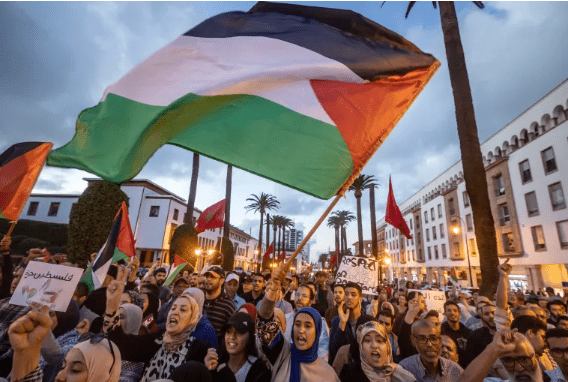
The response of Arab governments to Israel’s war on Gaza, like their response to its previous four wars on the besieged Palestinian enclave, has been feeble and flimsy, to say the least. But unlike Israel’s past assaults, this unravelling genocide – if not stopped – will have dangerous repercussions for the entire Arab world.
Caught by surprise, Arab leaders sprung into action only after the Arab public made it clear it would not tolerate Israeli atrocities against Gaza’s 2.3 million Palestinians. Although Palestine has been and remains the foremost Arab issue, speaking up is all they have done, mostly in babble and cliches.
In their Arab League meeting in Cairo on October 11, Arab foreign ministers condemned the killing and targeting of civilians “on both sides”, equating the occupied and the occupiers, a Palestinian resistance group and the Israeli occupation army. They spoke vaguely about the need for peace, as Israel set off to re-enact the 1948 Nakba (catastrophe) with another round of violent ethnic cleansing.
The bombing of al-Ahli hospital on October 17, in which some 470 Palestinians were massacred, enraged the Arab and international public, forcing the Arab regimes to react with a bit more resolve.
A few days later, Arab foreign ministers succeeded in lobbying UN member states to pass a United Nations Generally Assembly resolution condemning both the October 7 attacks and Israel’s atrocities and calling for an “immediate, durable and sustained humanitarian truce leading to a cessation of hostilities”.
The overwhelming support for the resolution, albeit watered-down and non-binding, has demonstrated Israeli isolation within the international community. But the Israeli authorities ignored it altogether, clearly moved by the principle of “the world says what it wants, Israel does what it must”.
They nonchalantly proceeded to launch a devastating land invasion of the Gaza Strip, cutting off telecommunications in the territory for 36 hours and sowing even more death and destruction.
Israel believes that the Arab states are too divided, impotent and indifferent to Palestinian suffering to respond adequately.
It is not wrong, alas.
Official Arab support for the Palestinian cause has persistently waned over the years. It started with Egyptian President Anwar Sadat’s decision to sign a peace treaty with Israel in 1979. Three years later, no one tried to stop the Israeli invasion of Lebanon, which expelled the Palestine Liberation Organization (PLO) from the country and paved the way for the emergence of Hezbollah in Lebanon and Hamas in Palestine.
In the following four decades, Arab regimes continued to show less and less interest in rallying behind the Palestinian cause, as the Arab world was ravaged by multiple wars, including the Iraq-Iran conflict and the Iraq invasion of Kuwait, two US-led Gulf wars, as well as multiple civil wars following the 2011 Arab Spring revolutions.
Today, Arab leaders may be willing to speak out for Palestine, but few are ready or capable of walking their talk. Those with the means to influence events do not mean what they say, and the few who mean what they say lack the means to follow through.
Truth be told, Arab leaders have generally been at odds with Israel as a divisive colonial enterprise in their midst, but they have also been indifferent to the plight of the Palestinians, just as they have been towards the suffering of their citizens.
In fact, some regimes have treated their people almost as badly as Israel has treated the Palestinians. Many have spoken for Palestinian rights only because that has given them a semblance of legitimacy in the eyes of their people.
Arab impotence has opened the way for other regional players, Iran and Turkey, to flex their muscles and expand their influence at Arab expense, creating another layer of regional complexity and division. Iran’s deepening influence and reckless policies in a number of Arab countries have pushed some frantic regimes to openly ally themselves with Israel in return for greater American support.
But that has proven shortsighted as neither Israel nor the United States can or is willing to guarantee their security.
Today, these regimes tacitly blame Iran and Hamas for the ongoing escalation in Gaza that is meant to undermine their new partnerships with Israel and drag them into a regional war. Indeed, government-associated preachers, journalists and pundits in countries like Egypt, Saudi Arabia and the United Arab Emirates have condemned what they consider to be Hamas’s attempts inspired by Iran to push the region into war, inflicting unbearable suffering on the Palestinian people.
But such positions have not swayed Arab public opinion. Wherever they have been allowed to, Arabs have taken to the streets en masse to protest against Israel’s atrocities and to call for an international intervention to stop the mass killing of Palestinian civilians. Protest may turn into mass upheaval that can threaten regional stability if no action is taken
As Israel continues to decimate Gaza and commit massacres of Palestinian children, women and men, its Arab partners must reconsider their normalisation and cooperation agreements before they are forced to do so under heavy public pressure.
This de-normalisation process must start with the Palestinian Authority itself, whose insistence on maintaining relations with Israel has allowed it to deepen its military occupation and accelerate the theft of Palestinian land.
It is high time for the regime of President Mahmoud Abbas to sever relations with the Israeli government and start protecting its civilians from the Israeli army and settlers wreaking havoc in the West Bank.
Arab leaders must come together to end the genocide in Gaza, come what may. Because only by uniting and speaking in one voice in favour of Arab and Palestinian rights.






